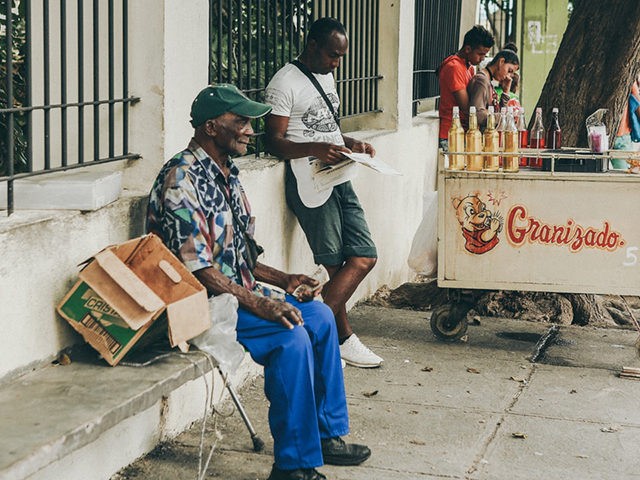Residents of Havana denounced the Cuban government in a report Tuesday revealing they have often spent as long as two weeks without access to running water in the past three months amid the Chinese coronavirus pandemic.
Havana has been plagued for years with dilapidated infrastructure in residential neighborhoods as well as chronic shortages of food and water. During the pandemic, however, when doctors have said that washing hands often is a key to preventing the spread of the coronavirus, Cubans now say the lack of access to water is as much a health risk as a severe inconvenience, forcing them into other neighborhoods to find wells and carry back buckets of water for toilets, cooking, and to use for baths.
“We have been in this water situation for almost three months,” Jaqueline Heredia, a resident of central Havana, told the U.S.-based Martí News on Tuesday. “The neighbors have gone to complain to Havana Water … but they just tell them they will check it out, that there are problems.”
“Sometimes we spend 15 days without water and we have to carry it from some state place to take baths,” Heredia noted, adding that Communist Party agents insist Cubans maintain proper hygiene to fight the Chinese coronavirus but, “with what water?”
The Cubans in Havana who reported to Martí that they do receive water do so in spurts of six hours every two weeks, or receive a consistent flow of dirty, smelly water.
“The water here is coming in black, dark, smelly, as if it came from a hole in the ground,” Robert Pérez told the outlet. Government officials tell neighbors that they already fixed the problem, he added.
Water shortages are not uncommon throughout the country, particularly in the increasingly neglected Havana, a 400-year-old city with little maintenance work done to keep it running. Prior to the official arrival of the coronavirus in Cuba, the independent news outlet Cubanet detailed water rations throughout the capital coupled with broken pipes clearly wasting water flowing into the streets.
“One of the most inefficient and unstable services is the administration of water, since over the years, along with government abandon, the deterioration of hydraulic infrastructure has increased dramatically,” Cubanet noted in February.” “To justify the strict distribution schedule – five hours on alternate days for most municipalities, except for those ‘favored’ – they use drought and population increase as excuses.”
The author noted that “baths” using small jars of water had become commonplace in Havana.
Cuba’s communist regime first documented coronavirus cases in mid-March, identifying them as Italian tourists. The Castro regime’s initial response to the pandemic was to increase tourism advertising, attempting to stay open to foreigners and attract tourists whose vacations elsewhere had been canceled. Cuba eventually shut its borders — for which it received praise from far-left media outlets in the United States — after Cuban citizens took to the streets to protest, attracting international attention.
To solve the water crisis, Cuba kept its schools open and demanded that parents send children to school with their own soap and water. Soap is as difficult as water, or perhaps more so, to procure for the average Cuba. By the end of March, authorities in Havana had promised that running water would enter homes once every three days, a promise they have apparently failed to keep.
Despite the heightened need for water to help Cubans protect themselves from coronavirus infection, Cuban communist officials imposed fines of up to 3,000 Cuban pesos for people found guilty of “wasting” water. A doctor in Cuba earns, thanks to a newly announced raise, 1,460 Cuban pesos per month.
Access to water for washing hands is particularly important given Cuba’s ongoing food shortages, also a product of its socialist economy – the government owns and runs all farmland, imprisoning or exiling the nation’s experienced farmers and herders six decades ago. The Communist Party has routinely failed in the past two years to secure the necessary supplies of basic goods like milk and wheat to feed the nation.
To procure food — often rotted chicken meat or vegetables consumed by parasites — Cubans must wait on long, densely organized lines for hours on end. Here, their proximity to each other, especially in light of many not wearing masks or being forced to make masks out of available clothing, exposes them to high risk of infection. Not waiting on the line could result in not having food to eat.
“The production of food is a national security issue. Cuba attends to the production of rice and pork meat in a differentiated way in the current national situation,” Gustavo Rodríguez Rollero, the nation’s minister of agriculture, said this week, comments Cubanet noted were bizarre given that pork and domestically produce rice have been missing from ration distribution centers in Cuba for months.
At press time, the communist regime — known for fabricating medical statistics — claims to have documented 2,432 cases of Chinese coronavirus and 87 deaths.

COMMENTS
Please let us know if you're having issues with commenting.